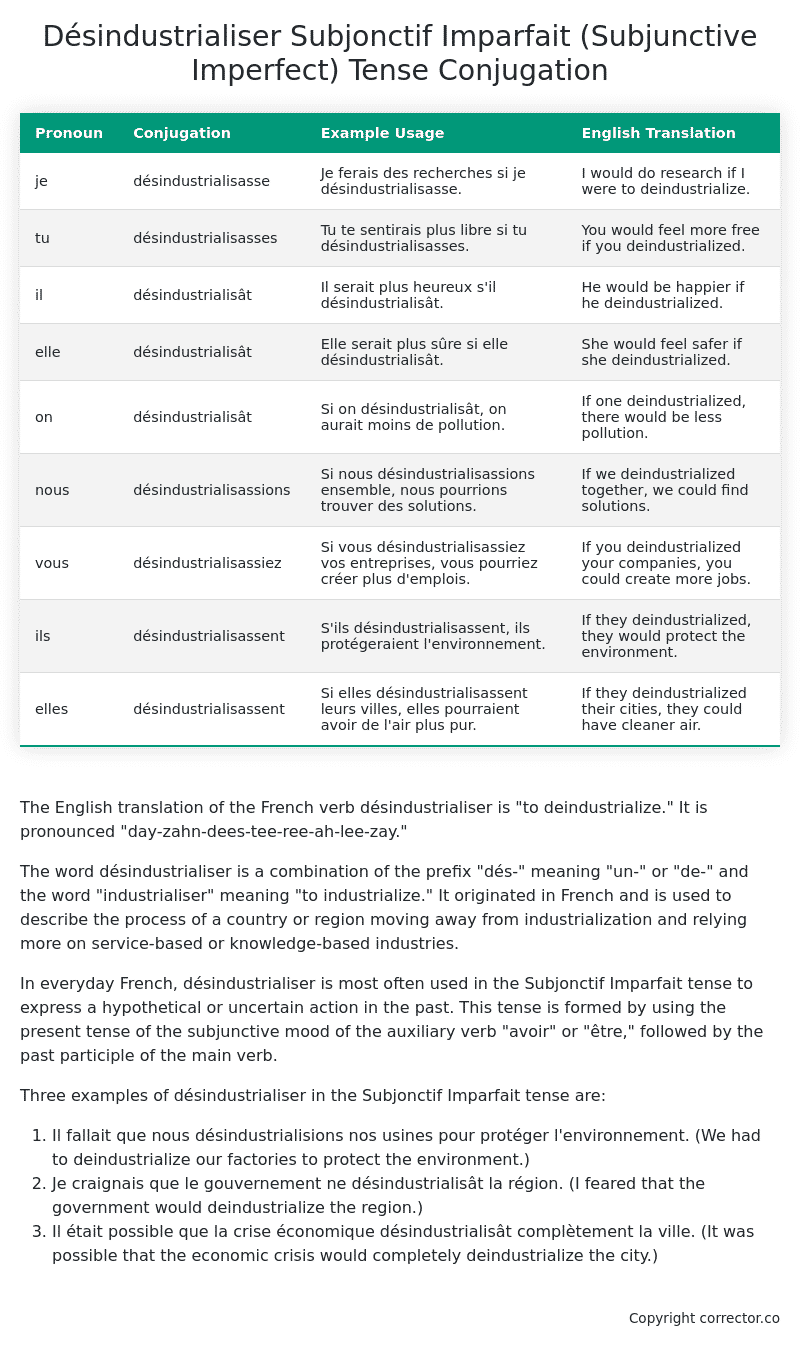Subjonctif Imparfait (Subjunctive Imperfect) Tense Conjugation of the French Verb désindustrialiser
Introduction to the verb désindustrialiser
The English translation of the French verb désindustrialiser is “to deindustrialize.” It is pronounced “day-zahn-dees-tee-ree-ah-lee-zay.”
The word désindustrialiser is a combination of the prefix “dés-” meaning “un-” or “de-” and the word “industrialiser” meaning “to industrialize.” It originated in French and is used to describe the process of a country or region moving away from industrialization and relying more on service-based or knowledge-based industries.
In everyday French, désindustrialiser is most often used in the Subjonctif Imparfait tense to express a hypothetical or uncertain action in the past. This tense is formed by using the present tense of the subjunctive mood of the auxiliary verb “avoir” or “être,” followed by the past participle of the main verb.
Three examples of désindustrialiser in the Subjonctif Imparfait tense are:
- Il fallait que nous désindustrialisions nos usines pour protéger l’environnement. (We had to deindustrialize our factories to protect the environment.)
- Je craignais que le gouvernement ne désindustrialisât la région. (I feared that the government would deindustrialize the region.)
- Il était possible que la crise économique désindustrialisât complètement la ville. (It was possible that the economic crisis would completely deindustrialize the city.)
Table of the Subjonctif Imparfait (Subjunctive Imperfect) Tense Conjugation of désindustrialiser
| Pronoun | Conjugation | Example Usage | English Translation |
|---|---|---|---|
| je | désindustrialisasse | Je ferais des recherches si je désindustrialisasse. | I would do research if I were to deindustrialize. |
| tu | désindustrialisasses | Tu te sentirais plus libre si tu désindustrialisasses. | You would feel more free if you deindustrialized. |
| il | désindustrialisât | Il serait plus heureux s’il désindustrialisât. | He would be happier if he deindustrialized. |
| elle | désindustrialisât | Elle serait plus sûre si elle désindustrialisât. | She would feel safer if she deindustrialized. |
| on | désindustrialisât | Si on désindustrialisât, on aurait moins de pollution. | If one deindustrialized, there would be less pollution. |
| nous | désindustrialisassions | Si nous désindustrialisassions ensemble, nous pourrions trouver des solutions. | If we deindustrialized together, we could find solutions. |
| vous | désindustrialisassiez | Si vous désindustrialisassiez vos entreprises, vous pourriez créer plus d’emplois. | If you deindustrialized your companies, you could create more jobs. |
| ils | désindustrialisassent | S’ils désindustrialisassent, ils protégeraient l’environnement. | If they deindustrialized, they would protect the environment. |
| elles | désindustrialisassent | Si elles désindustrialisassent leurs villes, elles pourraient avoir de l’air plus pur. | If they deindustrialized their cities, they could have cleaner air. |
Other Conjugations for Désindustrialiser.
Le Present (Present Tense) Conjugation of the French Verb désindustrialiser
Imparfait (Imperfect) Tense Conjugation of the French Verb désindustrialiser
Passé Simple (Simple Past) Tense Conjugation of the French Verb désindustrialiser
Passé Composé (Present Perfect) Tense Conjugation of the French Verb désindustrialiser
Futur Simple (Simple Future) Tense Conjugation of the French Verb désindustrialiser
Futur Proche (Near Future) Tense Conjugation of the French Verb désindustrialiser
Plus-que-parfait (Pluperfect) Tense Conjugation of the French Verb désindustrialiser
Passé Antérieur (Past Anterior) Tense Conjugation of the French Verb désindustrialiser
Futur Antérieur (Future Anterior) Tense Conjugation of the French Verb désindustrialiser
Subjonctif Présent (Subjunctive Present) Tense Conjugation of the French Verb désindustrialiser
Subjonctif Passé (Subjunctive Past) Tense Conjugation of the French Verb désindustrialiser
Subjonctif Imparfait (Subjunctive Imperfect) Tense Conjugation of the French Verb désindustrialiser (this article)
Conditionnel Présent (Conditional Present) Tense Conjugation of the French Verb désindustrialiser
Conditionnel Passé (Conditional Past) Tense Conjugation of the French Verb désindustrialiser
L’impératif Présent (Imperative Present) Tense Conjugation of the French Verb désindustrialiser
L’infinitif Présent (Infinitive Present) Tense Conjugation of the French Verb désindustrialiser
Struggling with French verbs or the language in general? Why not use our free French Grammar Checker – no registration required!
Get a FREE Download Study Sheet of this Conjugation 🔥
Simply right click the image below, click “save image” and get your free reference for the désindustrialiser Subjonctif Imparfait tense conjugation!

Désindustrialiser – About the French Subjonctif Imparfait (Subjunctive Imperfect) Tense
Formation
Common Everyday Usage Patterns
Interactions with Other Tenses
Subjonctif Présent
Indicatif Passé Composé
Conditional
Conditional Perfect
Summary
I hope you enjoyed this article on the verb désindustrialiser. Still in a learning mood? Check out another TOTALLY random French verb conjugation!


